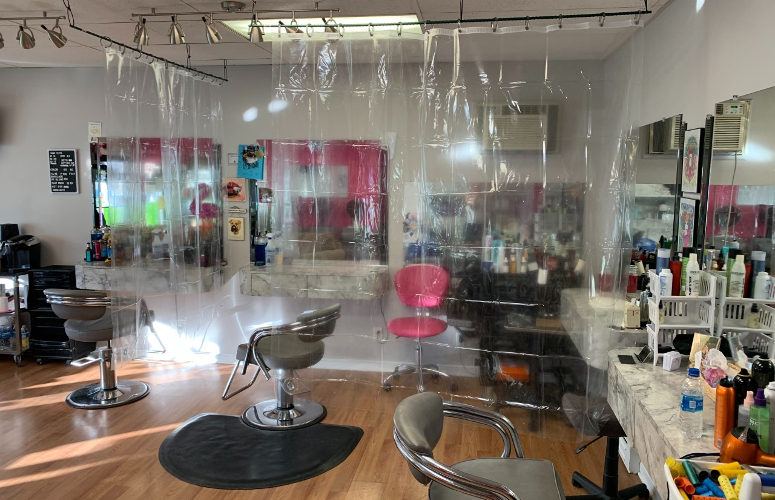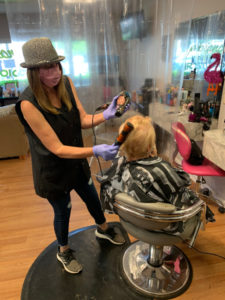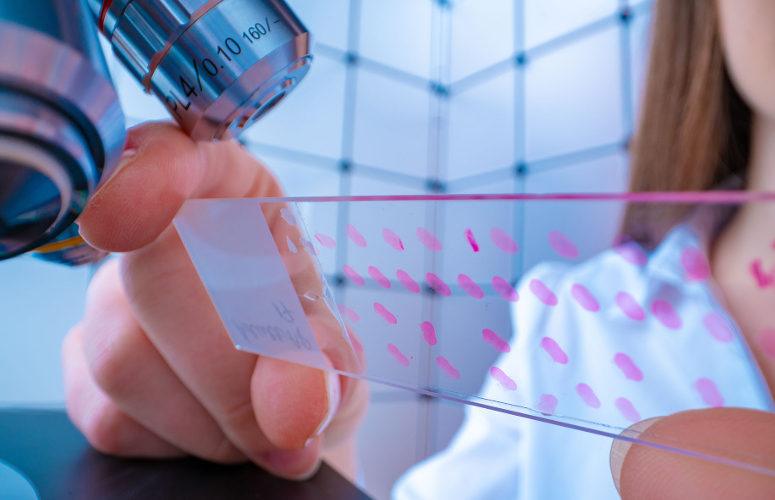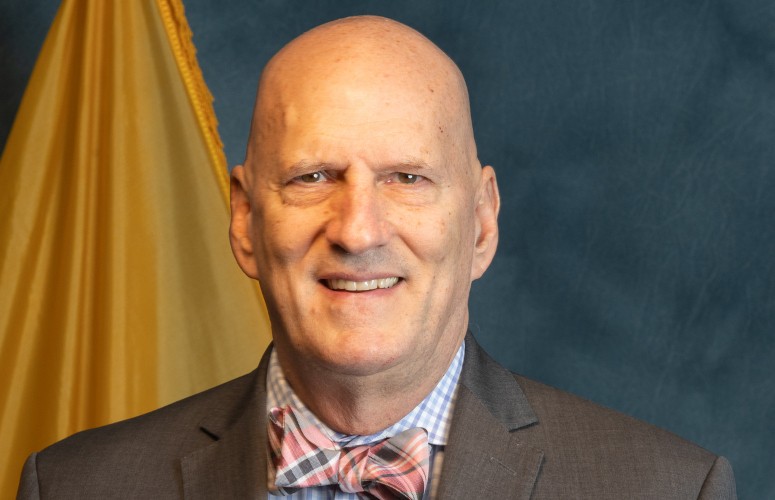
A Do or ‘Dye’ Situation: Ambiance Hair Studio Reopens Under New Guidelines
By Anthony Birritteri, Editor-in-Chief On Jun 22, 2020At a Friday, June 12 press briefing, Gov. Phil Murphy declared that beauty salons, along with other personal care businesses across the state, could reopen on June 22.
Wendy Montanye, owner of Newton-based Ambiance Hair Studio, Inc., had no idea the announcement was made. So, she was surprised to hear her smart phone beeping and ringing with a constant flow of calls and texts from clients who wanted to make appointments.
Interviewed this past Saturday before the official reopening of her shop today, she told New Jersey Business, “I’m now booked, and I’m hoping that everyone who comes in feels safe.”

Wendy Montanye, owner of Ambiance Hair Studio, cutting and styling a customer’s hair during today’s reopening.
The opening is a godsend for Montanye, who lost her sole source of income when the business shutdown on March 19. Ambiance’s revenues were between $6,000 and $8,000 a month. With that money gone, rent, utility and supplier bills still had to be paid. The mortgage on her home also had to be paid, and food had to be bought.
“I had no income,” she explained. “The shutdown had been financially devastating for the business and for me, personally.”
The day after she closed her doors, Montanye tried applying for unemployment on the state’s website. It was a repetitive act of futility because the site kept kicking her off … up until April 9. At that point, she was able to get through and certify her weekly benefits, but the response she received always stated “pending.” After contacting the state via email, she was able to file a claim. However, every time she would check on it, she would see the message: “Not payable at this time.”
“So, I have not collected any unemployment benefits at all,” she said.
She said she is also eligible to receive Pandemic Unemployment Assistance, but has not heard from the State Department of Labor.
How did she manage to survive until today’s reopening? Montanye was able to receive a $4,800 Paycheck Protection Program (PPP) loan and a $2,000 Economic Injury Disaster Loan from the Small Business Administration (SBA). Just as important, and perhaps more humbling, was the fact that two of her clients each sent her $100 checks. One client even sent her a second check for the same amount.
Additionally, Montanye tried to earn extra money by selling hair-coloring kits at curbside, but on the day she began selling the items, the Newton police arrived at her salon. “They weren’t sure if I was allowed to sell curbside, and one of the officers said they had to call the prosecutor’s office and the state to find out. When I heard “prosecutor’s office,’ I started crying. I thought I was in trouble,” she recalled. “After some research, the police said I definitely was not allowed to sell curbside.”
Luckily, she was able to sell the kits online. The downside of all of this was that she just made under $200 from this endeavor.
It was the SBA loans that allowed Montanye to pay her two part-time employees and herself, and pay two months of rent. Having to spend some $1,000 for personal protective equipment (PPE) and materials to make her salon OSHA compliant, she said there is very little of that SBA money left.
Under OSHA guidelines, Montanye, with the help of her fiancé Brian (who also lost is job due to the pandemic), hung plastic curtain dividers between four stations, at the cash register, and waiting area, etc. Disposable capes, masks and gloves, plus face shields (for herself and employees) and alcohol for disinfecting were all ordered … with Montanye seeing various instances of price gouging for supplies on Amazon.
She and her two employees also had to undergo Barbicide COVID-19 certification, a new required educational program.
Montanye can only work on one customer at a time under the new guidelines, where – prior to the pandemic – she would cut one person’s hair while simultaneously giving hair color treatments to one or two other customers, for example. So, one can imagine how much business she may lose by this slowdown in workflow. To make up for this loss and meet customer demand, Montanye intends to stay open until 8 pm each night rather than locking the door at the regular 6 pm closing time. She also expects to stay open longer on Saturdays.
She must now take the temperature of all clients who walk through her door. She also must: call the client 48 hours in advance of the appointment to make sure they don’t have a fever; have them call from their cars when they arrive and have them wait in their vehicles (preferably) until she is ready for them; and customers cannot bring anyone else with them into the salon.
She must also ask customers the following questions, as required by OSHA guidelines:
- Have you had a cough?
- Have you had a fever?
- Have you been around anyone exhibiting these symptoms within the past 14 days?
- Are you living with anyone who is sick or quarantined?
Montanye is having customers sign a waiver that would hopefully shield her and her business from potential liabilities. She intends to use the form, which asks similar questions as in the OSHA guidelines above, for contact information in case a client comes down with the illness.
Asked if she expects to be profitable following all of these guidelines and with the continuing need to buy PPE, she candidly said, “I’m not sure. … I’m glad I’ve made it so far because many salons are closing. … All of this is going to be one day at a time, one client at a time. .. Overall, we need to get back to work, but this is all very scary.”
To access more business news, visit NJB News Now.
Related Articles:






